Some People Say the Main Way to Be Happy in Life is to Have a Lot of Money – IELTS Writing Task 2
Check out this IELTS Writing Task 2 Direct Question Essay with Band 7, 8, and 9 sample answers on the topic "Some People Say The Main Way To Be Happy In Life Is To Have A Lot Of Money," along with useful vocabulary and writing connectors.
Table of Contents
- Question
- Structural Breakdown
- Some People Say The Main Way To Be Happy In Life Is To Have A Lot Of Money - Sample Answer 1
- Some People Say The Main Way To Be Happy In Life Is To Have A Lot Of Money - Sample Answer 2
- Some People Say The Main Way To Be Happy In Life Is To Have A Lot Of Money - Sample Answer 3
- Some People Say The Main Way To Be Happy In Life Is To Have A Lot Of Money - Vocabulary
- Some People Say The Main Way To Be Happy In Life Is To Have A Lot Of Money - Connectors Used

Try AI Essay Checker for Instant Band Score
This blog delves into the Direct Question Essay, also known as the Two-Part Question Essay in IELTS Writing Task 2. This essay type requires test-takers to respond to two distinct questions presented in the prompt, demanding both clarity of thought and strong argumentation skills.
To help you understand this question type in IELTS Writing Task 2, we take a closer look at the topic: “Some people say the main way to be happy in life is to have a lot of money.” Through this example, we not only explore the structure and strategy behind answering Direct Question essays but also provide three sample answers with different approaches and a vocabulary list to enhance your writing.
Question
You should spend about 40 minutes on this task.
Some people say the main way to be happy in life is to have a lot of money. How might having a lot of money make people happy? What other things in life can make people happy?
You should write at least 250 words.
Structural Breakdown
|
Essay Type:
Introduction
Body Paragraph 1
Body Paragraph 2
Conclusion
|
Some People Say The Main Way To Be Happy In Life Is To Have A Lot Of Money - Sample Answer 1
It is often argued that wealth is the primary path to happiness in life. Undoubtedly, having a substantial amount of money can contribute significantly to one’s happiness in various ways. Firstly, financial stability provided by wealth can alleviate stress and anxiety related to basic needs such as food, shelter, and healthcare. Knowing that these necessities are readily available can bring a sense of security and peace of mind, fostering a happier state of being. Moreover, wealth can enable individuals to indulge in experiences and luxuries that bring them joy, whether it be traveling to exotic destinations, purchasing high-quality goods, or enjoying leisure activities. This ability to fulfill desires and aspirations can enhance overall life satisfaction.
However, happiness derived solely from wealth is often superficial and short-lived. Research suggests that beyond a certain income threshold, additional wealth does not significantly increase happiness. Moreover, the pursuit of wealth can lead to a relentless cycle of materialism and competition, detracting from meaningful relationships and experiences. True happiness lies in a balance between material comfort and emotional fulfillment.
Beyond financial wealth, numerous other factors contribute to happiness. Meaningful relationships, for instance, are essential for emotional well-being. Spending quality time with family and friends, sharing experiences, and providing and receiving support can bring immense joy and fulfillment. Additionally, pursuing passions and interests, whether it be through hobbies, creative endeavors, or personal development, adds richness and purpose to life. Furthermore, contributing to the well-being of others through acts of kindness, volunteering, or philanthropy can evoke a profound sense of satisfaction and happiness. In essence, while money can facilitate certain aspects of happiness, it is far from being the sole determinant.
Struggling to Crack the IELTS essays? Our 8+ band trainers have got you! Sign up for a FREE demo now!
Some People Say The Main Way To Be Happy In Life Is To Have A Lot Of Money - Sample Answer 2
The contention that wealth is the paramount route to happiness in life is a perspective often upheld by many. It is indisputable that possessing considerable wealth can furnish individuals with a multitude of avenues through which happiness can be attained. Primarily, financial affluence affords individuals the luxury of not having to worry about fulfilling basic needs, thereby alleviating stress and fostering a sense of security and contentment. Moreover, wealth provides individuals with the means to indulge in various leisure activities, travel to exotic locales, and procure high-end commodities, all of which contribute significantly to enhancing one’s overall satisfaction and well-being.
However, it is crucial to acknowledge the limitations of equating wealth with happiness. While material comforts can undoubtedly contribute to momentary happiness, sustained fulfillment often transcends monetary possessions. Research indicates that once basic needs are met, additional wealth has diminishing returns on happiness. Furthermore, the pursuit of wealth can engender a sense of emptiness and disillusionment, as individuals may find themselves trapped in a perpetual cycle of consumerism and materialism, devoid of deeper meaning and purpose in life.
In addition to financial prosperity, there exist myriad other facets of life that are instrumental in fostering happiness and well-being. Meaningful relationships, characterized by love, trust, and companionship, are paramount in nurturing emotional fulfillment and contentment. Devoting time to cultivate these relationships and forge meaningful connections can bring immeasurable joy and satisfaction. Furthermore, pursuing passions and hobbies, whether it be engaging in creative endeavors, sports, or intellectual pursuits, allows individuals to experience a profound sense of fulfillment and self-actualization.
Moreover, acts of altruism and generosity, such as volunteering or philanthropy, not only contribute to the well-being of others but also evoke a deep sense of purpose and fulfillment in the giver.
Ready to grab the latest IELTS writing task 2 question papers of 2025? Buy now!
Some People Say The Main Way To Be Happy In Life Is To Have A Lot Of Money - Sample Answer 3
The assertion that wealth is synonymous with happiness is a notion deeply ingrained in contemporary society. While it is undeniable that financial prosperity can facilitate certain avenues to happiness, a nuanced understanding reveals that true fulfillment transcends material possessions. Wealth undoubtedly provides individuals with a sense of security and comfort, allowing for the fulfillment of basic needs and the pursuit of leisure activities. Moreover, the ability to indulge in experiences and luxuries can undoubtedly contribute to momentary joy and satisfaction.
However, the correlation between wealth and happiness is far more complex than a simple cause-and-effect relationship. Beyond a certain threshold, additional wealth has diminishing returns on happiness, as material possessions become less consequential in determining overall well-being. Moreover, the pursuit of wealth can lead to a relentless cycle of consumerism and materialism, detracting from deeper sources of fulfillment and meaning in life.
In contrast, numerous intangible factors play a pivotal role in fostering genuine happiness and well-being. Meaningful relationships, characterized by love, trust, and mutual support, are fundamental in nurturing emotional fulfillment and contentment. Investing time and effort in cultivating these connections can yield profound and lasting benefits. Furthermore, pursuing passions and interests, whether it be through creative endeavors, intellectual pursuits, or physical activities, allows individuals to experience a sense of flow and self-actualization, transcending mundane concerns and tapping into their innate potential.
Moreover, acts of kindness and altruism, such as volunteering, philanthropy, and community engagement, not only benefit others but also evoke a deep sense of purpose and fulfillment in the giver. Ultimately, happiness emerges from a harmonious integration of material comfort, meaningful relationships, personal growth, and a sense of contributing to something greater than oneself.
Curious about your IELTS Writing score? Submit your IELTS Writing Essay for evaluation & get improvement tips!
Some People Say The Main Way To Be Happy In Life Is To Have A Lot Of Money - Vocabulary
Have a look at the IELTS Vocabulary used in the sample answers for ‘Some People Say the Main Way to Be Happy in Life is to Have a Lot of Money - IELTS Writing Task 2.
- Substantial
Meaning: Large in amount or degree.
Example: The company reported a substantial increase in profits this quarter. - Alleviate
Meaning: To make (suffering, deficiency, or a problem) less severe.
Example: Painkillers can help alleviate the symptoms of a headache. - Aspirations
Meaning: Strong desires or ambitions.
Example: Her lifelong aspiration is to travel the world and explore different cultures. - Superficial
Meaning: Existing or occurring at or on the surface.
Example: Their friendship was superficial, based more on convenience than genuine connection. - Threshold
Meaning: The level, point, or value above which something is true or will take place.
Example: The company is on the threshold of launching its new product line. - Materialism
Meaning: A tendency to consider material possessions and physical comfort as more important than spiritual values.
Example: The culture of materialism in society often leads to dissatisfaction and emptiness. - Relentless
Meaning: Harsh or inflexible; unyielding.
Example: The relentless heat made it difficult to concentrate on anything. - Philanthropy
Meaning: The desire to promote the welfare of others, especially by donating money to good causes.
Example: The billionaire’s philanthropy has funded numerous educational initiatives around the world. - Proclaim
Meaning: To announce officially or publicly.
Example: The president proclaimed a national day of mourning for the victims of the tragedy. - Intricate
Meaning: Very complicated or detailed.
Example: The artist’s painting was admired for its intricate details and vibrant colors.
Enroll in our free IELTS online coaching and learn how to write IELTS essays like a champ!
Some People Say The Main Way To Be Happy In Life Is To Have A Lot Of Money - Connectors Used
Connectors play a crucial role in linking ideas and creating a smooth flow of information within a text. Here is a list of common connectors that can be used in the provided answers:
- Firstly
- Moreover
- However
- Furthermore
- In addition
- In contrast
- Nonetheless
- Additionally
- Moreover
- Ultimately
- Nevertheless
- Furthermore
- To conclude
Boost your IELTS Writing Task 2 score and learn how to write standout essays. Sign up for an expert session today!
Mastering the Direct Question essay in IELTS Writing Task 2 requires clarity, critical thinking, and a well-organized response. By analyzing sample answers and understanding how to present a strong viewpoint, you can enhance your writing skills and aim for your desired IELTS Band Score. Remember to proofread your essay for grammar, vocabulary, and spelling errors. These tips, combined with practice, will help you write a well-structured and coherent IELTS Writing Task 2 Essay like the ‘Some People Say the Main Way to Be Happy in Life is to Have a Lot of Money.’
Practice IELTS Writing Task 2 based on Essay types

Start Preparing for IELTS: Get Your 10-Day Study Plan Today!
Explore other Direct Question Essays
Recent Articles

Haniya Yashfeen
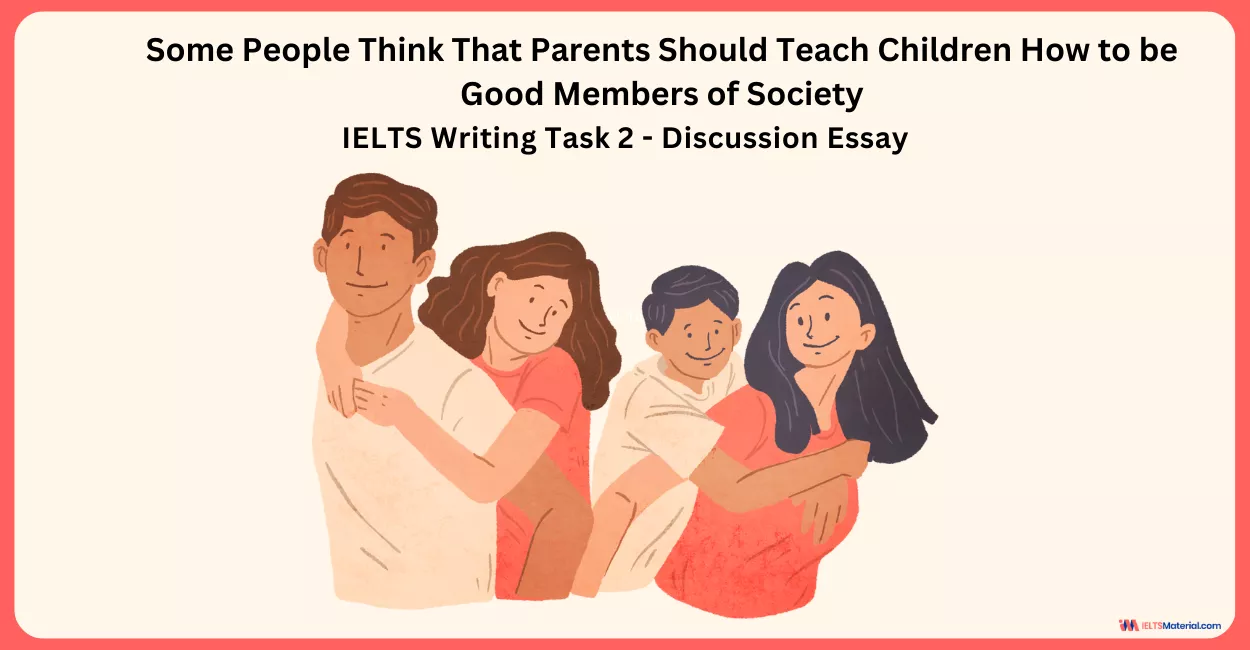

Prity Mallick

Kasturika Samanta
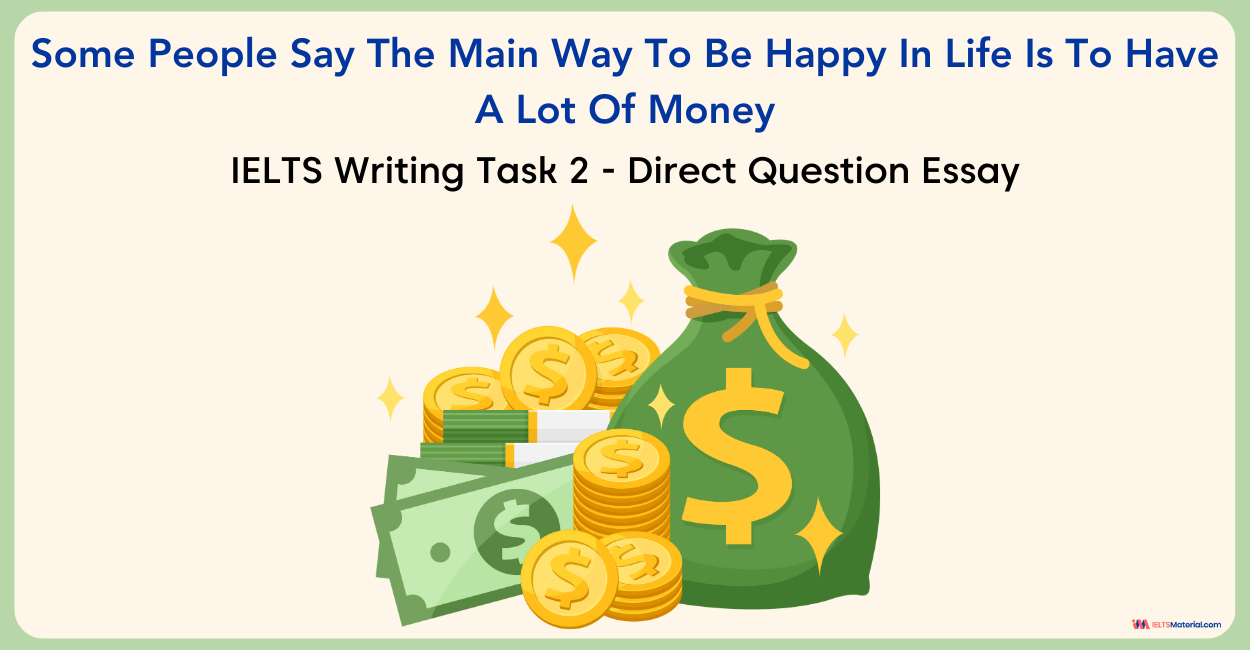

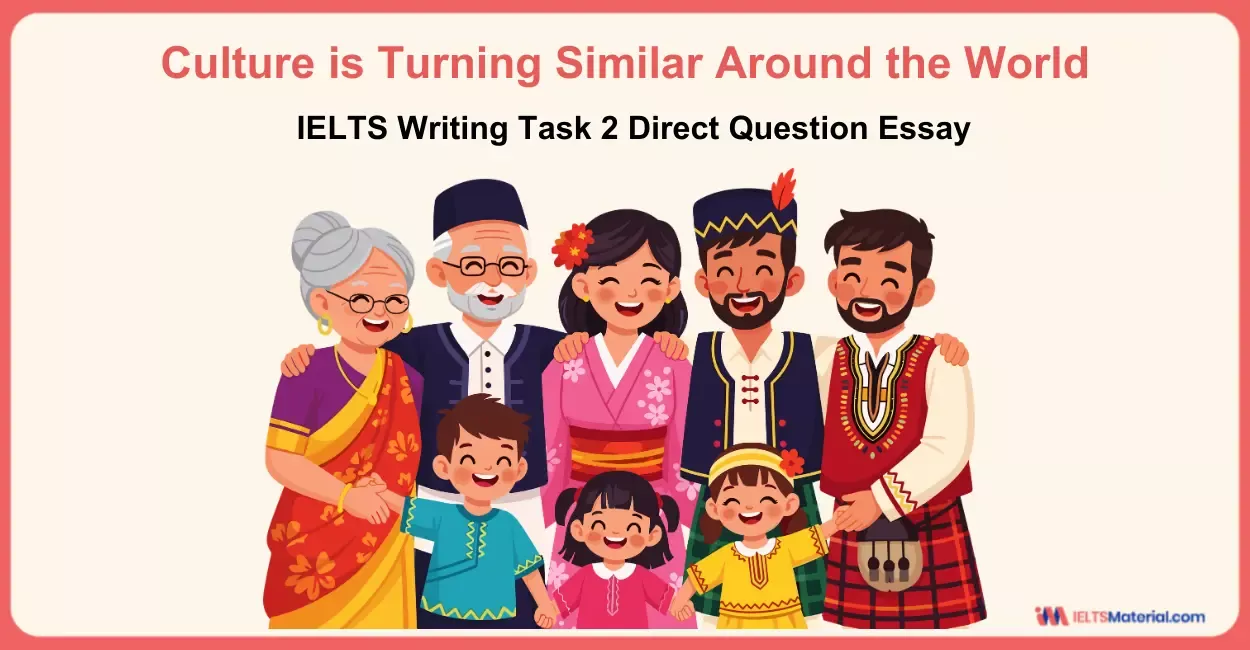
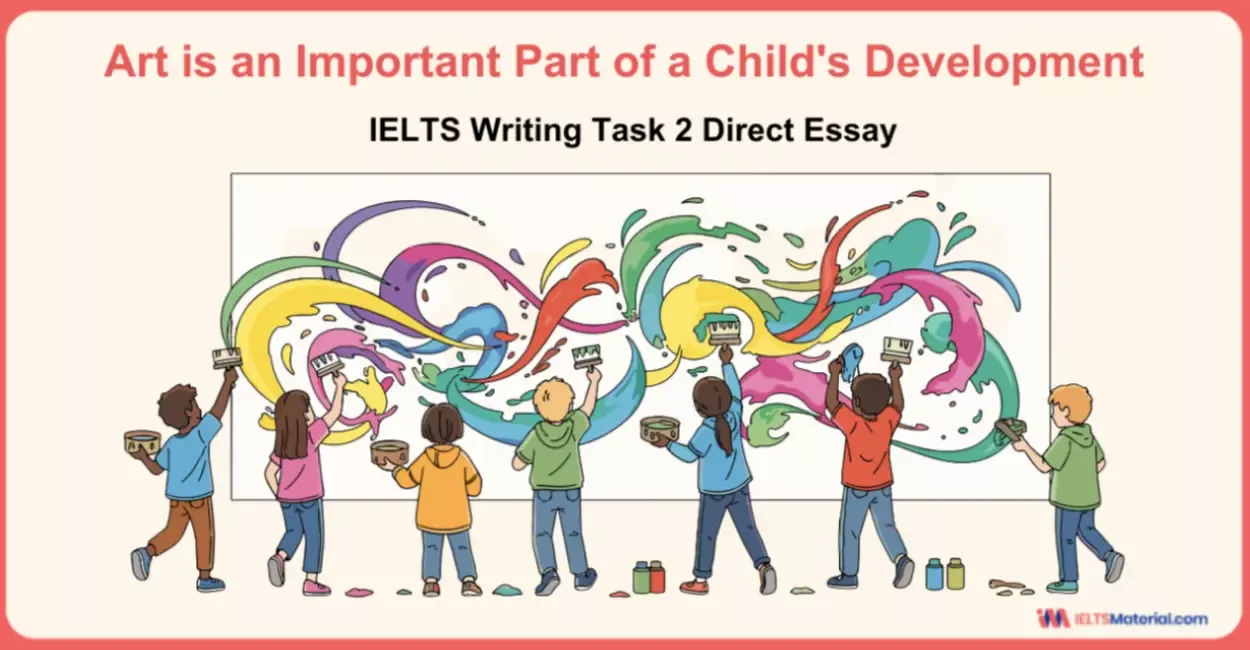
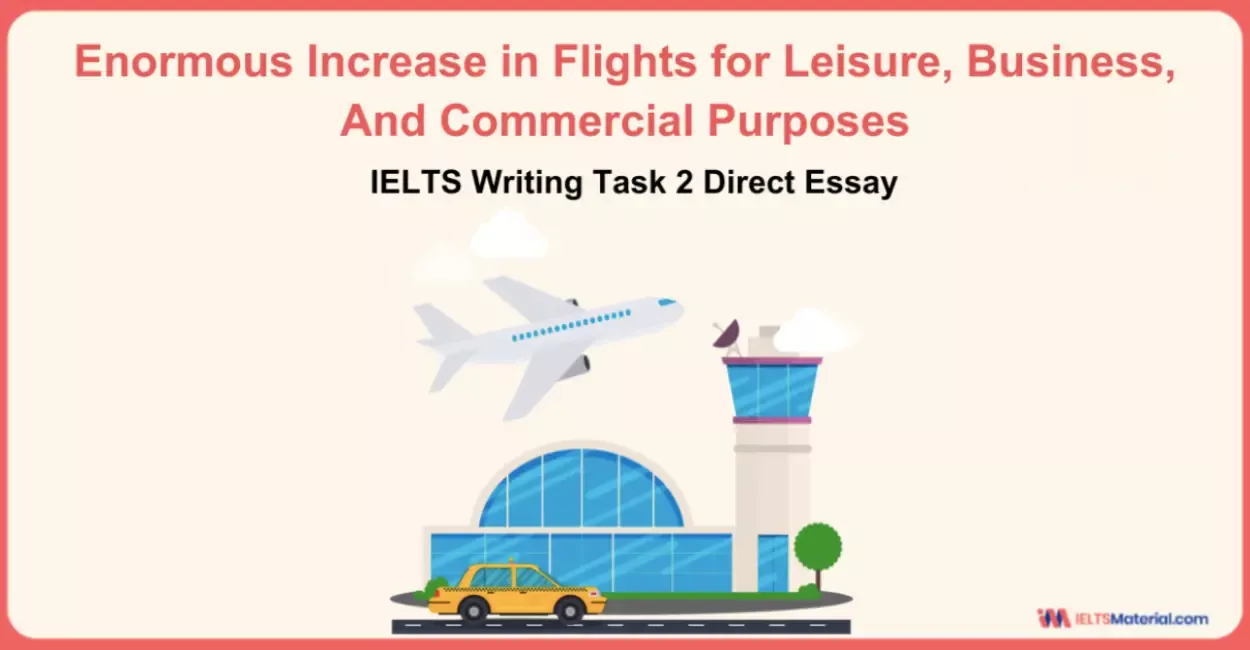
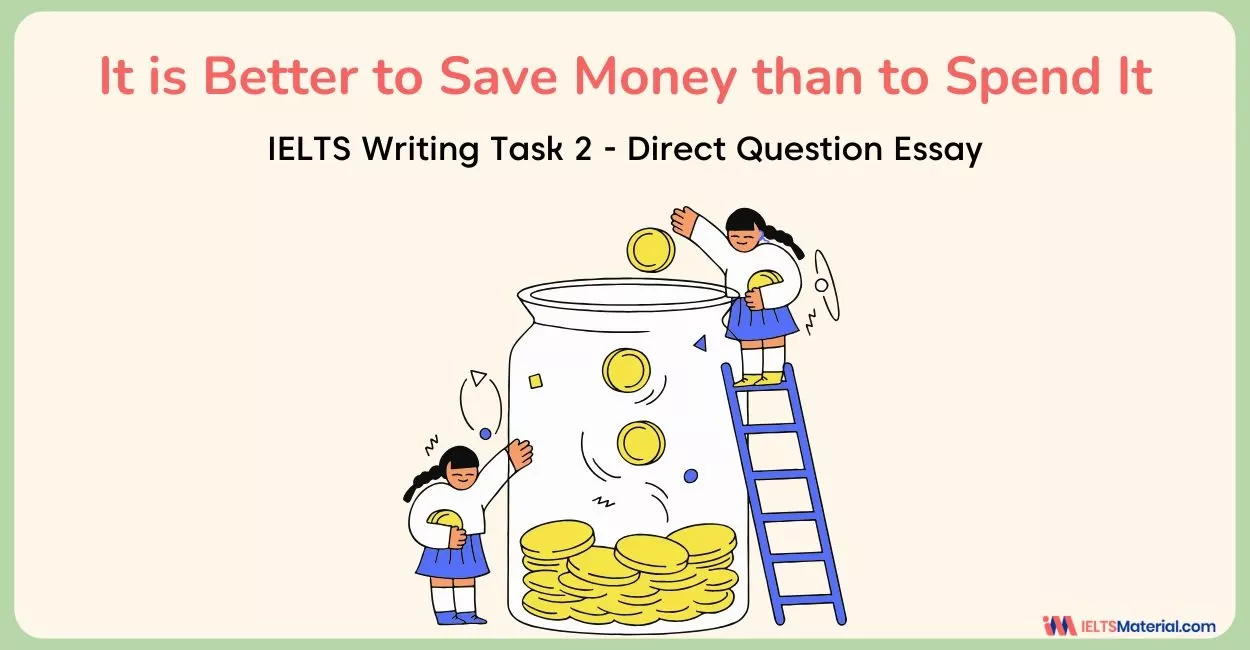


Post your Comments